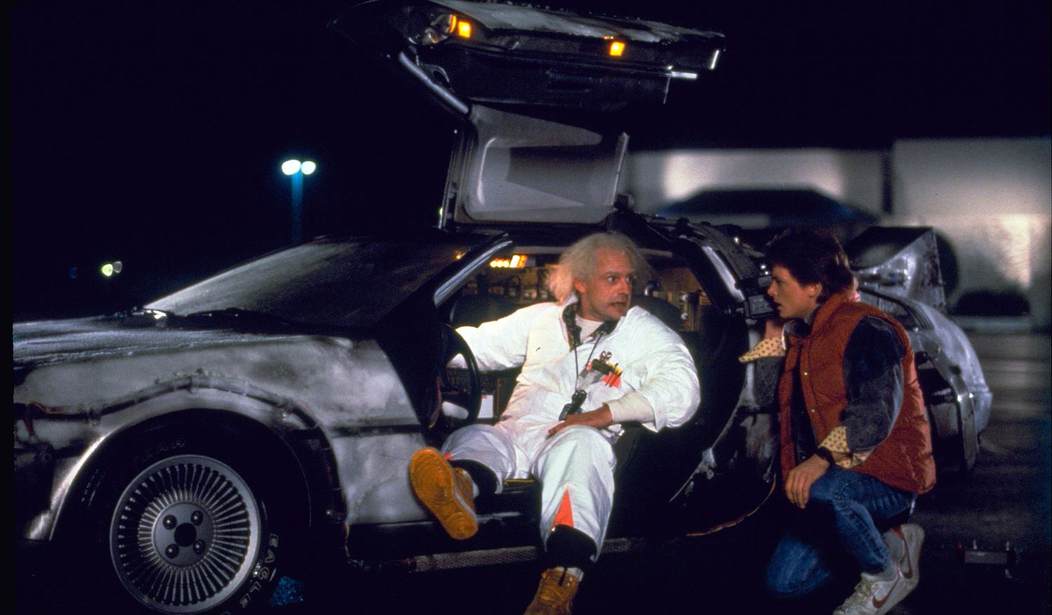We all remember the closing scene of 1985’s Back to the Future. “Doc” Emmett Brown has just returned from 2015 in his now-flying DeLorean to bring Marty McFly and his girlfriend/future wife Jennifer back to the future to do something about their kids. But he needs fuel. Not to run the car, mind you, because that’s still good old gasoline. The extra fuel is for the flux capacitor, which of course makes time travel possible.
Mr. Fusion, powered by used banana peels and almost empty beer cans, became the running gag for a lot of jokes for a lot of years since the movie came out, but a step toward turning Mr. Fusion into reality actually took place this week at Lawrence Livermore Labs across the bay from San Francisco.
Before diving into this story and geeking out on scientific advancements and their possible applicability on energy production, let me state that I’m a traditionalist, but open to scientific advancements if and when they make sense. For instance, right now, there is simply nothing on the consumer level that presents more potential energy for its size, weight and volume than a can of gas. There just isn’t. Electric vehicles can’t match the performance or longevity of a gas-powered car as of yet and probably never will, because there hasn’t been enough advancement in battery production to produce the same power output without their increased size and weight.
The environmentalists running around Washington and populating the federal government are trying to get you out of fossil fuels and into solar panels and wind turbines, the latter which essentially are 20-ton vertical food processors. They don’t objectively seem to me anything remotely close to a medium or long-term solution to this country’s energy needs. Fossil fuel remains readily available and is very reliable, but does have some negative impact on the climate. It remains to be seen how much and how permanent that impact is.
Nuclear power is an energy source that produces the least amount of waste per capita, and it is increasingly being made scalable and showing to be among the safest forms of electrical production. Its downside is its portability, or actually, its lack of portability.
Fusion reaction has been the holy grail of energy production for a long time. The question facing physicists was could you create a reaction by injecting energy into something and have that reaction generate more energy than went into it? Could that be sustained once ignited? Could it then be harnessed efficiently?
Scientists around the world have been studying nuclear fusion for decades, hoping to recreate it with a new source that provides limitless, carbon-free energy – without the nuclear waste created by current nuclear reactors. Fusion projects mainly use the elements deuterium and tritium – both of which are isotopes of hydrogen.
The deuterium from a glass of water, with a little tritium added, could power a house for a year. Tritium is rarer and more challenging to obtain, although it can be synthetically made.
“Unlike coal, you only need a small amount of hydrogen, and it is the most abundant thing found in the universe,” Julio Friedmann, chief scientist at Carbon Direct and a former chief energy technologist at Lawrence Livermore, told CNN. “Hydrogen is found in water so the stuff that generates this energy is wildly unlimited and it is clean.”
Marv Adams held a press conference on behalf of Lawrence Livermore to explain in layman’s terms, what this first step was, and what it could mean down the road.
This seems to me to be an exciting first step. Obviously, a lot more development and advancement must take place before we celebrate fully and turn every home in America into the Clark Griswold house at Christmas. This is quite literally the beginning of the beginning of this age. But make no mistake, a new age has dawned, and it could have awesome repercussions on how life is lived in future generations.
The politics of this will be fascinating as well. All of the climate alarmists are jumping up and down, thinking this is the death knell for Big Oil. Well, not quite yet, but maybe. Eventually. What it will mean, if advancements in this field continue and we move towards a world where fusion energy becomes a thing, solar panels and wind turbines will be relegated to a graveyard next to the old neon signs outside of Las Vegas. And that will be a very, very good thing.
My angle on the politics of this has to do with education. STEM schools are going to be crucial going forward. What we need are more scientists who aren’t woke and are instead driven to experiment until we see if this technology is truly viable or not. The short-term gain of education reform that was begun in Virginia and codified in Arizona with their backpack funding bill placing parents back in the loop of where their kids go to school and what kind of educational curriculum they will receive, should be replicated all over the country. We simply must catch kids back up from what was lost during the COVID lockdown, and we have to bypass the social engineering leftists want and get back to teaching kids the necessary steps in order to eventually take the place of today’s scientists in a baton pass.
I’m 56 years old. Even though history has shown that technological advances tend to increase at an accelerated rate once an initial breakthrough has been achieved, I’m unlikely to see Mr. Fusion powering my Ford F150 pickup in my lifetime. I’d like to think it could happen while my kids are still alive, but even that may be optimistically rosy. Whenever that day ultimately happens, if it happens, we need to continue building nuclear plants in the here and now, and we have to keep drilling, because both of those simply work the best for what our economy needs.
Now while we’re talking scientific advancements, can we all at least agree that what constitutes as a hoverboard isn’t really a hoverboard until you remove the big wheel touching the ground and have the board actually hover?








